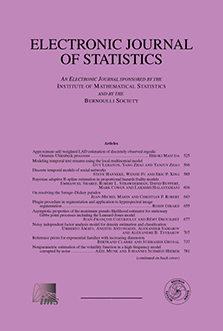Abstract
Let Mn(k) denote the kth largest maximum of a sample (X1,X2,…,Xn) from parent X with continuous distribution. Assume there exist normalizing constants an>0, bn∈ℝ and a nondegenerate distribution G such that $a_{n}^{-1}(M_{n}^{(1)}-b_{n})\stackrel{w}{\to}G$. Then for fixed k∈ℕ, the almost sure convergence of $$\begin{eqnarray*}\frac{1}{D_{N}}\sum_{n=k}^{N}d_{n}\mathbb{I}\{M_{n}^{(1)}\,{\le}\,a_{n}x_{1}\,{+}\,b_{n},M_{n}^{(2)}\,{\le}\,a_{n}x_{2}\,{+}\,b_{n},\ldots,M_{n}^{(k)}\le a_{n}x_{k}\,{+}\,b_{n}\}\end{eqnarray*}$$ is derived if the positive weight sequence (dn) with DN=∑n=1Ndn satisfies conditions provided by Hörmann. Some practical issues of this result are also discussed.
Citation
Zuoxiang Peng. Jiaona Li. Saralees Nadarajah. "Almost sure convergence of extreme order statistics." Electron. J. Statist. 3 546 - 556, 2009. https://doi.org/10.1214/08-EJS303
Information





